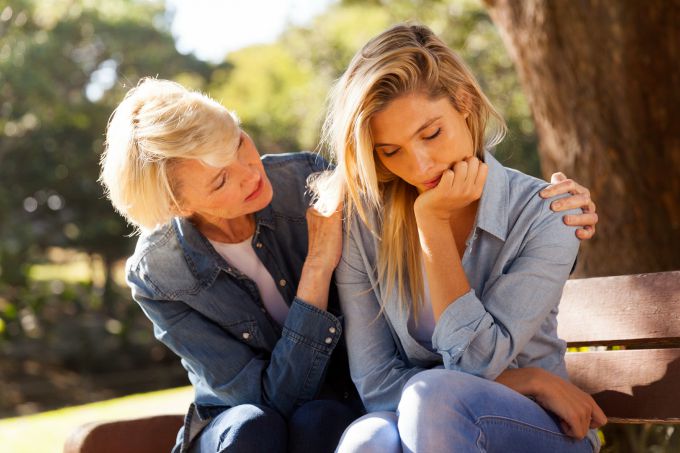Key Concepts:
Vocabulary: stages of grief, closure, coping, mourning, traumatic event
Coping with Loss and Grief
Acknowledging Loss
Main Idea: Acknowledging a loss is one way to help begin the healing process.
You have probably experienced a loss that left you feeling sad. Perhaps you moved to a new city and left behind good friends. You may have even experienced the death of someone you love. Everyone experiences loss during their lives and the grief that it brings. For example, you may have felt the pain of rejection, the breakup of a relationship, or the death of a pet, friend, or family member. Maybe you had to move or change schools and miss the friends you left behind.
Grieving is a common and natural reaction to any loss that brings on strong emotions. Loss feels hurtful, but it does not have to be harmful. Immediately after the loss, you may feel that your life will never be the same, and that you may never recover. Again, these feelings are natural. Acknowledging and understanding your grief will help you begin the healing process. This in turn will help you to cope with the loss and manage your feelings.

Expressing Grief
Main Idea: The grieving process can help people accept the loss and start to heal.
Feelings of loss are very personal. Some people feel sadness, guilt, or even anger. Some may talk about their loss; others may want to be alone. Sometimes people experience several or all of these emotions.
The Grieving Process
While everyone grieves in their own way, Swiss-American psychiatrist Elisabeth Kubler-Ross noted that the grieving process includes stages of grief, a variety of reactions that may surface as an individual makes sense of how a loss affects him or her. Not everyone goes through each stage, and the order may be different for each person. Here are the stages:
Denial or Numbness. It may be difficult to believe the loss has occurred.
Emotional Release. The loss is recognized. This stage often involve periods of crying.
Anger. The person uses anger because he or she feels powerless and unfairly deprived.
Bargaining. As the reality of the loss sets in, the person may promise to change if what was lost can be returned.
Depression. Beyond the feelings of sadness, feelings of isolation, alienation, and hopelessness may occur.
Remorse. The person may become preoccupied with thoughts about how the loss could have been prevented.
Acceptance. The person faces the reality of the loss, and experiences closure, or the acceptance of a loss.
Hope. Remembering becomes less painful, and the person begins to look ahead to the future.
Experiencing and accepting your feelings during grieving is necessary for healing. These feelings are part of coping, or dealing successfully with difficult changes in your life.
Coping with Death
Main Idea: Coping with death involves receiving and showing support.
Death is one of the most painful losses we can experience. Even if a person dies after a long illness, it’s likely that the survivors will grieve. If the death was sudden or traumatic, the survivors may also experience shock.
Most people respond to loss by mourning, the act of showing sorrow or grief. Mourning includes talking about the person, experiencing the pain of the loss, and searching for meaning. It may be difficult for some people to move out of the mourning process. Dwelling on things that can’t be changed will only add to your hurt. Instead, try to think about how the relationship was positive in your life.
Showing Empathy
Grieving alone makes the process more difficult. The friendship and support of others who are also grieving may make the process easier. If you can’t talk to family and other loved ones, try talking to a supportive friend.
If you know someone who is grieving, there are ways you can show support.
Help the person to recall happy, positive memories.
Be a sympathetic listener, and use silence when appropriate. Sometimes, just nodding your head shows that you understand what the person is saying.
Don’t rush the grieving process or attempt to resolve
the person’s grief in one day. Remember, no one can lead another person through this process or hurry through it.
Community Support
A person’s cultural background also influences grieving. Common mourning rituals, such as memorial services, wakes, and funerals are events that celebrate the life of the person who has died. Telling stories or describing why the person was special can help you move through the grieving process. The clergy and mental health professionals who specialize in grief can also provide support.
Coping with Traumatic Events
Main Idea: Support from family, friends, and community resources can help individuals recover from a traumatic event.
A traumatic event is any event that has a stressful impact sufficient to overwhelm your normal coping strategies. Traumatic events are sudden and shocking, such as accidents, violent assaults, suicides, and natural disasters. After a traumatic event, you may question your sense of security and confidence. Seek support from family members, friends, and community groups and agencies to help you manage your shock and grief. Also, trying to resume your normal activities can help you through the grieving process.